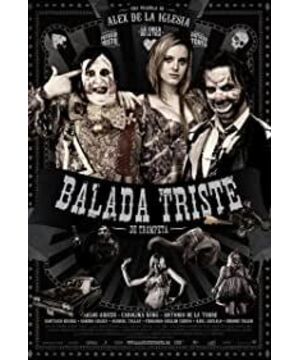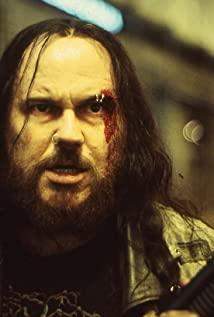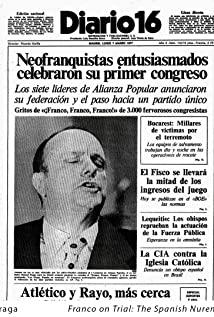The opening credits start with a graphic mark, then the three leading actors, and then the title of the movie. In the process, paintings, sculptures, buildings and maps intersect. Then came wanted photos, portraits of big heads, and historical photos, which, though only in black and white, had strong contrasts. Among them, images with a strong expressionist style are impressive, and religious elements are indispensable. In the following groups of superimposed characters, one character template becomes other characters, and there are characters mixed with horror films in the middle. From Franco to Kennedy, behind the continuously advancing historical clues of the title, there is horror and horror, which also planted the frenzied atmosphere of the following movies.
However, "Sad Trumpet" did not put this opening credits at the beginning. The film first explained that the father was forced to join the army, leaving the child alone. A lion ran out behind him, heralding the arrival of danger, and more of a shadow of a lifetime. This opening chapter explains a lot of important information. First, the brutality, blackness and absurdity of the civil war. Clowns who do not take off their makeup will also go to the front line and slash recklessly with a machete in hand. From the voice-over child's laughter to the end, "Sad Trumpet" becomes the silent weeping of two men. In this way, many people will think that the film is a mixture of sadness and joy, like the confrontation between the sad clown and the happy clown. But in fact, "Sad Trumpet" focuses on sadness, and the comedy jokes often make people laugh -- like Secchio's table jokes, which are eerily hilarious.
The first half of the movie is like mercury pouring down the ground, and the rhythm is fast. The tranquility of the film was just broken by the war, and immediately the stump was broken, and the flesh and blood flew. As soon as the shooting of the prisoners of war ended, in a blink of an eye, he tried his own life to save his father, and the outcome was tragic. Time flies so fast that the government builds the Valley of the Martyrs (Valley of the Fallen, the largest Franco-era relic in Spain), and Javier Javier grows up, fat, taciturn, and emerges as a loser. He applied for a job at the circus. In his dream, the muse fell from the sky, but in a blink of an eye, he was about to encounter the greatest enemy in life and work. As soon as the embarrassment in the tavern was lifted, it immediately became erotic, erotic dew, and violent. It can be said that the good drama of "Sad Trumpet" has only just begun until entering the circus full of eccentricities and metaphors. The war ahead was just a cold meal, not a dinner.
Almost inevitably, "Sad Trumpet" points the finger at the autocratic Franco. He has done bad things, and forcibly occupied Spain and enslaved the native people. But people have merits and demerits, and some people think that they still have good things. Just like a peace made out of national interests, several U.S. presidents have treated him well. Due to the discoloration and the timely standing of the team, Franco broke away from the fascists in his later years, and Spain was fairly stable under his rule. But "Sad Trumpet" began in the Spanish Civil War, and the left-wing camp and the right-wing camp were opposed, and the director's views need not be expressed. In the film, Secchio is alcoholic and violent, and the way he treats women is easy to think of Franco, especially regardless of whether he is abused and servile or not, Natalia always falls in love with him and is satisfied with lust and pleasure. Yet the Spanish Civil War was so complex that it was difficult to generalize. Javier, who was determined to take revenge, stood on the opposite side of Franco, but many times later, he behaved like an anarchist again, destroying wantonly, shooting indiscriminately, and became a bloody horror show. On the issue of revenge, who to avenge and whom to avenge, when Franco died peacefully, the resentful Spanish nationals were helpless. The rest, only the endless curse, cursed him to hell, to be burned by fire.
Once you can't enter this cultural context and don't understand the relevant historical background, then "Sad Trumpet" can really only be a crazy CULT film, which is full of chicken blood and blood. Director Iglesiah established the story time point in the 1970s, reflecting on the civil war in the 1930s, but in the language of the film, he chose German expressionism in the 1910s and 1920s. After all, in the national psychology, the Spaniards always have to face the dictatorship, and they have to reflect on it again and again. Ignatius is blunt, like in movies, we often prefer bad guys. And that's the most interesting thing, perhaps in this sense, it coincides with how the Spaniards see Franco. Alex likes to focus his vision on perverts and weirdos, and "Sad Trumpet" is no exception. By the end, they had become monstrous, mad beasts fighting for their prey—though they understood her to be a beloved, but rather a plaything. The amazing thing is that on the 150-meter-high cross, two beasts competed for the blonde girl, and a group of people below shot to cheer, and the rocket trapeze replaced the fighter.
In addition to paying tribute to old black and white films, "Sad Trumpet" directly involves historical wars, horror comedies, documentaries and other types. Like essential TV news, the director explained that it was a memory from his childhood, ETA blew up the Prime Minister, and the people on TV were a bunch of clowns. As soon as the era of Franco's rule came to an end, Spanish cinema also ushered in the rise, which also influenced many Spanish directors, who, intentionally or unintentionally, expressed the remnants of Franco's influence. Whether angry or depressed, it was a sad time. The lack of facts in history and the unavailability of the pursuit of democracy and freedom are manifested in the incompleteness of the characters, either self-destruction or stitching.
Just like the sudden news of Franco's death, the war that year was too late. "Sad Trumpet" uses video to show a lot of falls, exaggerated, wonderful or funny. The motorcycle trapeze in the circus is the most typical one. He kept trying, tried repeatedly, and finally gave his life in vain. When Javier goes to the circus, Natalia falls from the sky with a red ribbon wrapped around it. At the end, she also fell from a height and kept spinning. Even Javier escaped, became a savage in the cave, and drank blood, thanks to the fallen deer and wild boar. Even the repeated appearances of the sworn enemy Secchio were unpredictable.
"Sad Trumpet" is also mixed with the appearance of the Virgin Mary and religious redemption. When revenge is not available, Natalia is Javier's Maria, so he is willing to take the risk. This section is almost identical to "The Secret Records of the Saints", except that both explain the past of the civil war. Roland Joffe took a steady mainstream route, while "Sad Trumpet" belongs to the category of not surprising and endlessly dying. In addition to the fact that Franco is a famous believer, under the tall cross, it is actually a church. Franco's body was buried there, along with tens of thousands of other Civil War victims, including many members of the Republican Army. Conflicts in life, shooting each other, and burying them together after death is the absurdity of Spanish history. Comparing the endings of the happy clown and the sad clown, you will find that the crying eyes at the end are not accidental, but rather subtle. No wonder some people often lament that in the face of history, human beings often can only play the role of fooled clowns.
Almost all dictators love sculptures and statues, scattered everywhere. In this way, after their death, they can still be seen by future generations. However, the dictators are not immune to death, and their remains will be overthrown one by one, even if they are not smashed to ashes. In Spain, the government has already carried out a purge campaign, Franco has slowly disappeared from the public eye, and only words and images remain. When "Sad Trumpet" uses strong colors and twisted characters to express the history of dictatorship, it has been much more serious than most CULT films. If a Chinese audience is still unable to enter the context, then they only need to think of sensitive events and famous people who cannot be slandered. Even if the movie can only be a lament, "Sad Trumpet" is too serious and worthy of serious consideration. 【First Financial Daily】
View more about The Last Circus reviews











